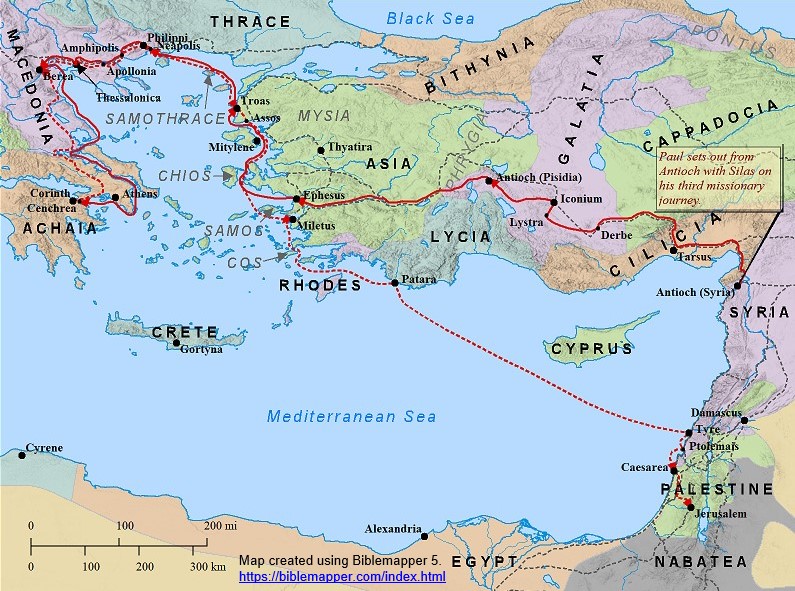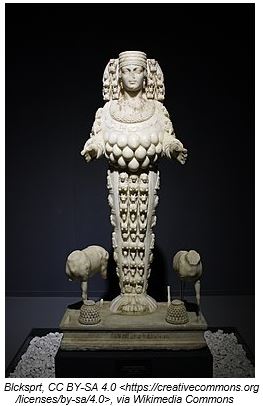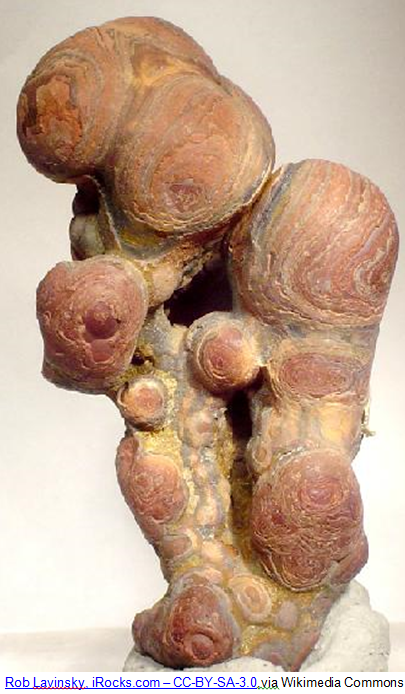
Paul had returned home to Antioch. Apollos had left Priscilla and Aquila in Ephesus and travelled 200 miles west by sea to Corinth. Here he was welcomed and accepted as a leader in the Church. However after a couple of years, divisions were appearing in the church at Corinth and he seems to have returned to Ephesus.
We don’t hear about Priscilla and Aquila again in Acts, but in 54 AD the Roman emperor Claudius died and Nero began his reign. The edict exiling Jews was repealed, so it seems that Priscilla and Aquila moved back to Rome where they established a church in their house (Romans 16:3-5). They were mentioned in two of Paul’s other letters – 1 Corinthians 16:19, 2 Timothy 4:19.
During this time Paul set off by land from Antioch on his Third Missionary Journey. Later we hear of others who accompanied him, although they may not all have been with him from the start (Acts 19:22, 20:4). Luke was again travelling with Paul – at least from Acts 20:5-6 where he uses ‘us’ and ‘we’.
Let’s read Acts 19:1-22
1 While Apollos was at Corinth, Paul took the road through the interior and arrived at Ephesus. There he found some disciples 2 and asked them, ‘Did you receive the Holy Spirit when you believed?’
They answered, ‘No, we have not even heard that there is a Holy Spirit.’
3 So Paul asked, ‘Then what baptism did you receive?’
‘John’s baptism,’ they replied.
4 Paul said, ‘John’s baptism was a baptism of repentance. He told the people to believe in the one coming after him, that is, in Jesus.’ 5 On hearing this, they were baptised in the name of the Lord Jesus. 6 When Paul placed his hands on them, the Holy Spirit came on them, and they spoke in tongues and prophesied. 7 There were about twelve men in all.
I think we can assume that these men had probably been disciples of Apollos – they had recognised their need for repentance but had not received the new life that Jesus offers.
I wonder if Apollos had been able to send word to Paul about these men as he may have felt responsible for not telling them the full Gospel. To say that ‘he found some disciples’ could mean he had specifically been looking for them.
In our last study we read that Priscilla and Aquila had invited Apollos to their home and explained to him the way of God more adequately. They explained to Apollos that through the death and resurrection of Christ, his sins were forgiven and he could accept Jesus into his life by the Holy Spirit. In the same way these disciples also now believed, and their response demonstrated the truth of their conversion!
8 Paul entered the synagogue and spoke boldly there for three months, arguing persuasively about the kingdom of God. 9 But some of them became obstinate; they refused to believe and publicly maligned the Way. So Paul left them. He took the disciples with him and had discussions daily in the lecture hall of Tyrannus.
It seems that Paul had been accepted as a Rabbi and was permitted to regularly teach in the Synagogue, gaining disciples.
(For more information on Rabbis and Disciples see the introduction to John’s Gospel.) Transferring to the lecture hall meant that he could continue virtually unopposed.
10 This went on for two years, so that all the Jews and Greeks who lived in the province of Asia heard the word of the Lord.
While based in Ephesus, Paul also made it his job to ensure that those living in the surrounding towns and villages also heard the Gospel.
11 God did extraordinary miracles through Paul,
We need to avoid rushing on in case we miss two important words in this verse: What are these and why are they important?
God, and Extraordinary.
These seemed more than the miracles worked by the Apostles in the power of the Holy Spirit in the early days (Acts 1-8). Here we are told that God himself worked through Paul, performing ‘extraordinary miracles.’
12 so that even handkerchiefs and aprons that had touched him were taken to those who were ill, and their illnesses were cured and the evil spirits left them.
Note that they recognised the distinction between illnesses and evil spirits.
13 Some Jews who went around driving out evil spirits tried to invoke the name of the Lord Jesus over those who were demon-possessed. They would say, ‘In the name of the Jesus whom Paul preaches, I command you to come out.’
In those days there were those who would, using spells, incantations and magic, heal and cast out demons (no – I don’t know how or if they did it. It seems it could only be through demonic powers – it certainly was not of God).
The fact that they seemed to travel from place to place suggests to me that by the time their cures were proved worthless, they had already moved on!
They had seen God at work through Paul, and immediately recognised that this was real. They therefore copied what they thought was a new ‘incantation’, hoping that they could gain from it.
14 Seven sons of Sceva, a Jewish chief priest, were doing this. 15 One day the evil spirit answered them, ‘Jesus I know, and Paul I know about, but who are you?’ 16 Then the man who had the evil spirit jumped on them and overpowered them all. He gave them such a beating that they ran out of the house naked and bleeding.
Evil spirits are real, not some form of psychological disorder. People who are so possessed can have the evil spirit driven out, but they will not go easily. Paul, under the direction of God by his Holy Spirit had the authority to do this, but unbelievers simply using the name of Jesus have no authority in the spiritual realm and are actually in great personal danger.
17 When this became known to the Jews and Greeks living in Ephesus, they were all seized with fear, and the name of the Lord Jesus was held in high honour.
Why were they ‘all seized with fear'?
Generally Jews and Greeks were opposed to the Christian message, and the name of Jesus was openly ridiculed. With such a demonstration of power they now quickly changed their attitude, and the realization that they had been openly speaking and acting against Almighty God himself caused them to be seized with fear.
Even among those who were not Christians, their attitude had changed, and the name of Jesus was now treated with the greatest respect.
18 Many of those who believed now came and openly confessed what they had done. 19 A number who had practised sorcery brought their scrolls together and burned them publicly. When they calculated the value of the scrolls, the total came to fifty thousand drachmas.(one Drachma = one day’s wage; if that were £100 that would be £5million).
Here the work of the Holy Spirit was evident, convicting and convincing of sin. Once people had accepted Jesus into their lives, anything of the devil was willingly destroyed.
20 In this way the word of the Lord spread widely and grew in power.
The door was now wide open for the Holy Spirit to convince and convict people of their sin, and for Paul to be able to explain the offer of salvation through faith in Jesus.
21 After all this had happened, Paul decided to go to Jerusalem, passing through Macedonia and Achaia. ‘After I have been there,’ he said, ‘I must visit Rome also.’
‘Paul decided to go to Jerusalem’ but not just yet! Actually as you can see from the map, he was first intending to move on another 500 miles further west. He really wanted to go to Rome, but that would have to wait for now.
It was now around 54 AD. It appears that Apollos had left Corinth (perhaps because of the factions growing in the church there — see 1 Corinthians 1:12 & chapter 3) and was back in Ephesus. Paul had encouraged him to return to Corinth but he was unwilling to just then (1 Corinthians 16:12. So during his extended stay in Ephesus Paul wrote to the Church in Corinth (1 Corinthians 16:8-9).
22 He sent two of his helpers, Timothy and Erastus, to Macedonia, while he stayed in the province of Asia a little longer.
It seems that Timothy and Erastus were charged with delivering the letter to the Corinthians – see 1 Corinthians 4:17 and be a steadying influence before Paul also could join them. In his letter he warned them that he himself would be returning shortly (1 Corinthians 4:19)
Having decided to move on, Paul was also delayed for a little longer because the Lord needed Paul to be a steadying influence in the church at Ephesus during the storm that was about to break.
Now read verses 23 to 41
23 About that time there arose a great disturbance about the Way. 24 A silversmith named Demetrius, who made silver shrines of Artemis, brought in a lot of business for the craftsmen there. 25 He called them together, along with the workers in related trades, and said: ‘You know, my friends, that we receive a good income from this business. 26 And you see and hear how this fellow Paul has convinced and led astray large numbers of people here in Ephesus and in practically the whole province of Asia. He says that gods made by human hands are no gods at all. 27 There is danger not only that our trade will lose its good name, but also that the temple of the great goddess Artemis will be discredited; and the goddess herself, who is worshipped throughout the province of Asia and the world, will be robbed of her divine majesty.’
Demetrius was quick to realise that with vast numbers turning to Christ, the whole industry surrounding the making of shrines, idols, icons, medallions etc. relating to the temple and the worship of the goddess Artemis could simply fizzle out. The modern phrase in verse 25 struck me: ‘related trades’. This was potentially a major economic disaster.
Paul was not afraid to speak the truth and ‘gods made by human hands are no gods at all’ (v26), was simply a logical extension of Paul’s message that there was only one true God. But it was pounced on by those who recognised that it could destroy their lucrative trade and bring them financial ruin.
28 When they heard this, they were furious and began shouting: ‘Great is Artemis of the Ephesians!’ 29 Soon the whole city was in an uproar. The people seized Gaius and Aristarchus, Paul’s travelling companions from Macedonia, and all of them rushed into the theatre together.
As always, the devil will not stand idly by and watch thousands turn to Christ and manipulating the crowd was easy.

30 Paul wanted to appear before the crowd, but the disciples would not let him. 31 Even some of the officials of the province, friends of Paul, sent him a message begging him not to venture into the theatre.
His disciples and city officials were well aware that it was unlikely that a prisoner, taken to the Roman theatre, would come away alive. Death was a common punishment and was regarded as acceptable entertainment.
32 The assembly was in confusion: some were shouting one thing, some another. Most of the people did not even know why they were there.
A noisy disturbance will always attract others: we are naturally inquisitive!
33 The Jews in the crowd pushed Alexander to the front, and they shouted instructions to him. He motioned for silence in order to make a defence before the people.
Who or what was he defending?
Was it Jews defending Christians? The Jewish religion, and the worship of a ‘One True God’ was generally accepted as being non-threatening. But an Alexander was also mentioned in Paul’s letters to Timothy, as a metalworker who did a great deal of harm. If it was him, perhaps he wanted to explain their grievances.

34 But when they realised he was a Jew, they all shouted in unison for about two hours: ‘Great is Artemis of the Ephesians!’
35 The city clerk quietened the crowd and said: ‘Fellow Ephesians, doesn’t all the world know that the city of Ephesus is the guardian of the temple of the great Artemis and of her image, which fell from heaven?
(Sometimes Artemis is depicted as a many-breasted goddess – perhaps taken from a particular example of botryoidal meteorite mineral which may have fallen many hundreds of years previously when the original temple was built (possibly around 1000BC). This picture depicts one variety, others look like bunches of black polished grapes.
36 Therefore, since these facts are undeniable, you ought to calm down and not do anything rash. 37 You have brought these men here, though they have neither robbed temples nor blasphemed our goddess.
Note again that the idol they were defending was totally unable to defend herself. But as the city clerk was quick to grasp, it was more a personal grievance that was the cause of the uproar.
38 If, then, Demetrius and his fellow craftsmen have a grievance against anybody, the courts are open and there are proconsuls. They can press charges. 39 If there is anything further you want to bring up, it must be settled in a legal assembly. 40 As it is, we are in danger of being charged with rioting because of what happened today. In that case we would not be able to account for this commotion, since there is no reason for it.’ 41 After he had said this, he dismissed the assembly.
So the immediate threat to the spread of the Gospel was frustrated, and Paul could continue his work unopposed.





